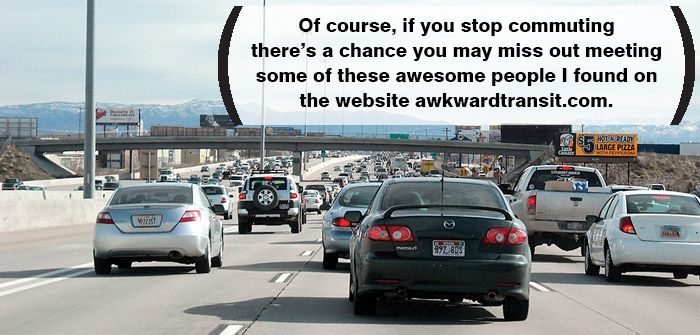(Photo courtesy of Flickr user Garrett)
My home of Madison, Wis. is hardly a megatropolis. According to the U.S. census bureau Wisconsin’s capital city has just over 240,000 residents. However, it feels like all 240,000 of them begin their daily commute when I do, bringing traffic on Madison’s freeway, known as the beltline, to a near halt. This problem is only magnified when there’s a fresh coating of fluffy white stuff on the ground prompting me to share my anxiety with the rest of the world by taking to the twitterverse.
When I became part of the BendBroadband family last September, the first thing I heard from the more than 260 “local dogs” in Central Oregon was that they had zero traffic. Zero. Turns out you have famously short commutes, the kind that make people pack up from Seattle, Portland, or San Francisco and move to Bend.
While some of those folks (and native Oregonians) are lucky enough to get a job near their home, many of them make the move work by telecommuting. Working remotely from home (or wherever you’d like) is becoming more popular every year. According to a recently published article in the New York Times telecommuting rose 79 percent between 2005 and 2012. Telecommuters account for about 2.6 percent of the American workforce, or about 3.2 million workers.
Not only does telecommuting save time and money for Central Oregonians, it may make you more productive. A recent telecommuting survey by PGi (Premiere Global Services, Inc.) found that 70 percent of respondents saw an improvement in their productivity. Eighty-two percent also say their stress level improved.
The Times article I mentioned earlier attributes the increase in telecommuting, in part, to better communications technology like VoIP (Voice over Internet Protocol) Many Central Oregon ISPs offer VoIP and modern versions of traditional voice services with mobility features built right into the phones.
BendBroadband Business Services offers a Business Voice product with features like simultaneous ring, which rings multiple phones at the same time when a call is received by your desk phone and remote office, which allows you to make and receive calls to another phone as if it was your office phone. These features ensure you won’t miss any important communication if you’re away from your desk.
I’m not trying to claim that Central Oregon’s amazing quality of life is all thanks to local ISPs like BendBroadband Business Services. But, when people in Bend brag about their lack of a commute, I may just start saying, “You’re welcome.”
Of course if you stop commuting there’s a chance you may miss out meeting some of these awesome people I found on the website awkwardtransit.com. The decision is yours.
Barclay Pollak is an award winning journalist and proud to be a member of the Corporate Communications team at BendBroadband. Follow on G+.






1 Comment
We are about to change the short commute time to match the other gridlock cities in the article:
The UGB process mandated by administrative rules coming out of Salem, influenced in great part by the Portland area Metro, is asking Bend to plan 30% more density in its existing City Limits, even though traffic studies show most of our major roadways failing at full build out at current density.
Add the proposed University on the West Side- and clog up Reed Market Road and other East West corridors and you have a recipe for a great downward shift in livability in Bend.
The UGB Process ends up being an unfunded mandate by the State to increase traffic density without any funding for new roads. Bicycles and walking are great ideas, but cannot make up the dramatic increase in traffic that is caused by purposely increasing the housing density.
Bend cannot even factor in the 30% influx of traffic due to tourism in the summer, that Cities like Beaverton and Tigard do not have.
Contact your State Representative and ask them to pass a measure allowing the Legislature to oversee administrative rules, and to allow Bend more leeway in charting its own future, instead of needing to be a carbon copy of less than liveable cities like Beaverton, Tigard and Portland.